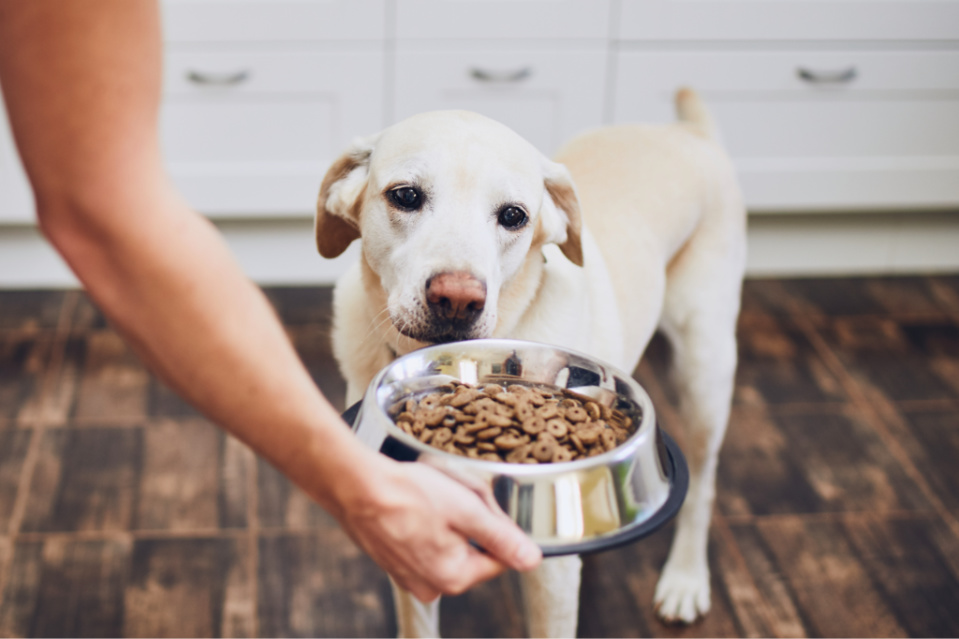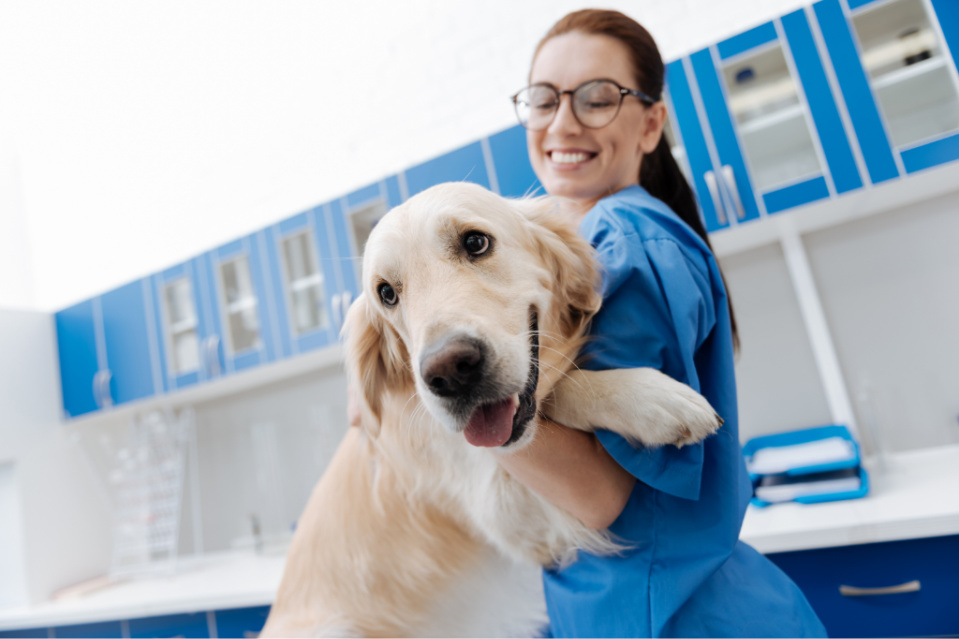If you have a dog throwing up food hours after eating, you may now be seriously wondering why your Labrador vomits.
Dogs are known for eating things that aren’t edible by human standards. This is especially true for Labrador Retrievers with their insatiable appetite.
Because of this, instances such as a dog throwing up undigested food may become something that you need to look into.
Here is a quick list of the common reasons why Labradors vomit, what to do, and when to bring them to a vet.
Is your Labrador regurgitating or vomits?
Before we talk about the common causes of vomiting, you need to learn the difference between dog regurgitation and dog vomiting.
If your Lab vomits, they remove all the contents of their upper small intestine and stomach. You will also notice fluid, food, and debris in the vomit.
Before your Lab vomits, they may look nauseated, have stomach contractions, retch, and excessively drool.
On the other hand, if your Lab regurgitates, your dog expels undigested fluids and foods. It usually comes from the esophagus, not the stomach and upper small intestine.
Your dog may also cough and have difficulty breathing before they regurgitate.
If you want to be sure whether your Lab is regurgitating or vomiting, you can take a look at the contents of what they expelled.
If your Lab regurgitated, then the contents may be shaped like the esophagus and not digested. But, if they vomited, there would be stomach fluids and mushy food.
Reasons why your Labrador vomits
1. New food

If you tried to give your dog a new kind of dog food, treat, or human food, especially if it was sudden, their tummy may not agree with it.
Their tummy is simply not used to the food, so this may be the reason why your Labrador vomits.
If you think that is the case, then you can simply not give them that food again and observe them.
If they look normal and do not vomit after not eating the new food again, then your Lab will be okay.
2. Poisons or toxins
Of course, poisons and toxins can lead to dog vomiting. Some obvious poisons and toxins that could cause your dog to vomit are certain poisonous plants, rat poison, and laundry detergent.
They also cannot handle certain medications that humans take, like pain and anti-inflammatory medicine.
However, it is important to remember that dogs cannot eat all the same food that we do.
Some foods can make your dog vomit and can be dangerous, especially in large amounts. These include:
- Alcohol
- Chocolate
- Raisins and grapes
- Xylitol (a sweetener)
- Macadamia nuts
- Avocado
- Caffeine
- Leeks, garlic, onions, and chives
- Processed food and junk food
If your Labrador Retriever eats these things and vomits, especially if they ate a lot of it, find a veterinarian immediately.
They may need to pump your Labrador’s stomach and give them the right medication to heal your dog.
3. Heat stroke
An overheated Lab can have many symptoms, which include excessive vomiting.
Dogs usually experience a heat stroke if it is hotter than 103 degrees Fahrenheit.
Some symptoms of a heatstroke include lethargy, lack of coordination, dizziness, excessive drooling, and glazed eyes.
If you suspect they have a heat stroke, give them a cool drink immediately and bring them to a vet.
4. Eating too much or too quickly
Most dogs, such as Labradors, do not realize when they are full since they love food. This, in turn, may cause them to overeat.
And since overeating can make their stomachs feel heavy and upset, this can lead to vomiting.
In other cases, it may also be that your Lab may eat too quickly.
This often happens when they are excited, feel like they have to compete for food with other dogs, or are very hungry.
The sudden consumption of food can make their stomach hurt, which can cause vomiting.
If your Lab eats too fast, what you can do is to create a space where they can eat alone and in peace.
Additionally, you can get them a slow-feeding bowl so that it will take them a longer time to pick up food.
What if my dog vomited but didn’t eat anything?
In some cases, your dog may vomit hard-to-digest food or objects from the day before.
That may be why they did not eat anything; their tummies were upset and trying to empty themselves.
If your dog has not eaten for a long time, their stomachs can feel very painful. They may vomit their stomach acids.
If that is the case, slowly give them more food and water—not too much right away—and take them to a vet.
In more extreme cases, there could be a hidden problem like a disease that made your dog vomit without eating anything. You will need to see a vet to confirm if your dog is sick and why your Labrador is vomiting.
When should I bring my Labrador to a vet?

If your Lab vomits one time, and they are fine afterward, you may not need to bring them to a vet.
They may have just eaten something that slightly upset their stomach, so they may not need to see a vet if they do not vomit again and subsequently act normal.
However, you need to bring them to a vet if they vomit multiple times within the same day.
Another worrying sign is when they expel a large amount of vomit. You should also bring them to a vet if there is blood in their vomit.
It is also especially important to bring them to a vet if they vomit immediately after eating something dangerous like a lot of chocolate or a cane toad. A vet will be able to give your dog the care it needs immediately.
Here are other symptoms that your dog may need to see a vet after vomiting:
- Decreased or increased urination
- Decrease or increase in thirst
- A sudden change of appetite
- Weight loss
- Lethargy
- Dehydration
- Diarrhea (especially if it is bloody)
- Seizures
What should I do if my Labrador vomits?
If your Lab vomits one time and they are fine afterward, you may not need to bring them to a vet. It’s possible that they may have just eaten something that slightly upset their stomach.
However, if they do not show any dangerous symptoms like those mentioned above, they may not need to see a vet, especially if they do not vomit again and act normal.
If your Lab is fine after vomiting one time, then you can treat them like a baby until they feel better.
Let them rest and make sure they have lots of fresh water to drink because vomiting can make them dehydrated.
You can give them a temporary soft diet that will not irritate their stomach.
You may also need to change their diet or go back to a previous diet. If you suddenly gave them new food and they vomited, it may be the cause why your Labrador vomits.
If I bring my Labrador to a vet, what could be the causes of why my Labrador vomits?
Of course, certain illnesses and health complications can also cause nausea and vomiting in dogs.
Here are some examples of illnesses and conditions that can cause vomiting in dogs:
- Pancreatitis
- Parvovirus
- Bacterial infections
- Viral infections
- A reaction to medication
- Intestinal parasites like worms
- Liver or kidney failure
If you suspect that your Lab has an illness that is causing them to a vomit, seek medical attention immediately. A veterinarian will be able to diagnose the problem and give your dog the medical attention that they need.
Dog vomiting treatments at home
If your Lab is fine after vomiting one time, then you can treat them like a baby until they feel better.
Let them rest and make sure they have lots of fresh water to drink because vomiting can make them dehydrated.
You can give them a temporary soft diet that will not irritate their stomach. Food like boiled skinless chicken, rice, and potatoes can help settle their tummy for a few days.
You may also need to change their diet or go back to a previous diet. If you suddenly gave them new food, and they vomited, it may be the cause. Therefore, you need to give them food with different ingredients.
In conclusion
If your dog vomits one time because they ate something that upset their tummy, it is usually something that you may not have to worry about.
However, if your dog has other alarming symptoms, ate something dangerous, or is potentially very sick, they need to see a vet right away.
Follow our suggestions above in the meantime to know what options you have when it comes to home remedies for dog vomiting.







